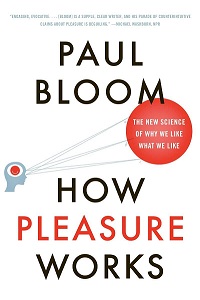What We're Reading Now
The Evolution of Pleasure
29 March 2022
Geof has been reading How Pleasure Works: The New Science of Why We Like What We Like by Paul Bloom. The book explores perceived human pleasure from an evolutionary adaptation point of view. Geof shares a few examples from Bloom’s book about sources of pleasure.
Tags: geof read
When my oldest daughter Zoe was three, she lost her beloved “Teddy,” a pink teddy-bear head attached to a blanket. We searched everywhere but teddy was not to be found. We unsuccessfully tried replacing “Teddy” with an exact replica, but this did not quiet her inconsolable tears. She could see the less worn “New Teddy” lacked the same wear and tear that made her first blanket “Teddy.” The differences were clearly visible. According to Paul Bloom, author of How Pleasure Works, there was a hidden essence that also distinguished the two blankets.
Objects, like Zoe’s baby blankets, have a value above simple utility because of what Bloom describes as “essentialism, the notion that things have an underlying reality or true nature that one cannot observe directly.” It is this essentialist mindset, a by-product of evolutionary adaptation and cultural socialization that is the source of pleasure (and displeasure).
“One way to sum this up is that humans start with fixed lists of pleasures and we can’t add to that list. This might sound like an insanely strong claim, because of course one can introduce new pleasures into the world, as with the inventions of chocolate, video games…crossword puzzles, reality television shows and so on. These are enjoyable because they are not that new; they connect – in a reasonably direct way – to pleasure that humans already possess. Belgian chocolate and barbecued ribs are modern inventions, but they appeal to our prior love of sugar and fat.”
Bloom explores the role of essentialism through a variety of lenses, including food, intimacy, and marketplaces.

Pleasure and Food.
Socialization and adaptation play a role in what foods we like (find pleasurable) because “food learning” is a part of cultural learning. Food transcends utility and plays a role for in-group socialization. Compare your parent’s favorite meal to your favorite meal. Research suggests that “there is a small relationship between the preferences of parents and their children.” There is a stronger relationship between married couples. “We don’t eat like our parents for the same reason we don’t dress like our parents.” Social learning is “accomplished by attending to one’s peers.” Think about the origin of your favorite type of cuisine. Perhaps the reason you find it so pleasurable is the role it played in helping you socialize, make friends, and strengthen those bonds.
Pleasure and Intimacy.
Bloom introduces research about conspicuous consumption and sexual attraction. Some derive pleasure from bottled water because it signals to others our ability to pay for something that is otherwise free and reassures ourselves that we are the type of person that can afford to pay for water. “The idea is that displays of personal quality are only taken seriously if they involve some cost, some level of difficulty or sacrifice. If anyone can easily do the display, then it is worthless.” Water (in the US) is pretty ubiquitous, and almost free from water fountains and taps. Bottled water attaches a sacrifice, cost, and difficulty to something almost universal. (Conversely, my wife has not had a bottled water since 2005. For her, the pleasure of her reusable water bottle is a signal of frugality and responsibility.) What are your own examples of guilty pleasures and conspicuous consumption that you might not even be aware of? What signal are you intending to send?
Pleasure and Ownership.
The endowment effect explains why the longer we own something the more valuable (pleasurable) it becomes to us. From an essentialist adaption standpoint endowment might explain the psychology behind a “bird in hand is worth two in the bush.” Our ancestors may have had an aversion to loss, and we therefore place a premium on things we already own. My Facebook Marketplace offers a great example of the endowment effect with my neighbors selling used coffee mugs, sweaters, and watches at prices well above market value. The other reasons we might derive more perceived value of things we own include “self-enhancement, and feeling good about ourselves, and we pump up the value of our choices and denigrate the road not taken.”
Essentialism and the Self.
The final reflection for essentialism is the idea of “incidental” vs “essential properties.” Bloom explains with an anecdote. “I had dinner with a friend a while ago and she said in passing that she never eats meat. But she bristled when I later referred to her as a vegetarian. ‘I’m not a fanatic about it,’ she said. ‘I just don’t eat meat.’ She saw her diet as an incidental property, not an essential one.” What are your incidental vs essential properties?
In addition to How Pleasure Works Bloom is also the author of Descartes’ Baby and a professor of psychology at Yale University. Visit his website at www.howpleasureworks.com.







Comments
Our Comment Policy:
Our blog posts are only half of the conversation. What our readers have to say is equally important to us, and we're grateful for all the comments that continue the dialog.
To ensure that the discussion here is as useful as possible to all of our readers, please be respectful of our contributors and refrain from harassing, threatening and/or vulgar language. We reserve the right to screen and remove any comments from the site. If you have a question about a comment or want to discuss our policy, please contact us. We'll talk it over.
There are no comments for this entry yet.